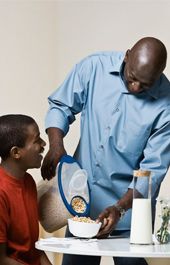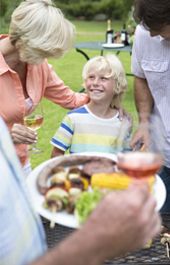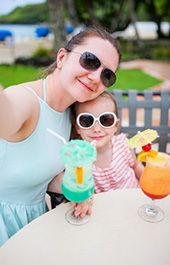

Worried after learning your child has had a drink – or two? Set up a movie night. Together, watch a movie showing how someone’s life is negatively affected by drinking alcohol. You know your child’s personality better than anyone, so pick an age-appropriate film that speaks to his or her personality. Maybe that’s a comedy, or action and adventure pick. Afterwards, take time for a teaching moment: sit down and discuss the impact drinking had on that person’s life and loved ones, and talk about how experimenting with drinking early can lead to alcoholism.
Tip: For teens, get creative and engage them by making your own movie short on a smartphone. Have them reenact their perception of a person’s behavior when drinking, the affects it has on one’s life, or scenarios where they are introduced to alcohol and ways to turn it down. Then, watch your homemade movie together and have an open conversation about the consequences of using alcohol.
Note: A NEWLY RELEASED BRITISH STUDY BUILDS ON SIMILAR RESEARCH FINDINGS SAYING ALCOHOL IN MOVIES LEADS TO EALIER DRINKING.

Sometimes the best way to reach your teen is through the experiences of others. Look for opportunities to talk one-on-one by sharing “real life” situations playing out in the news or on television. Search for stories online that discuss teen binge drinking, risky drinking behaviors, and other underage drinking issues. Watch TV shows like “Intervention,” profiling the lives and experiences of those living with alcohol and other addictions. Share articles about young people – and even celebs – whose lives and that of their family have been affected by drinking. Take the time to listen to your child’s feelings about what’s been seen or read, and discuss how drinking at a young age can lead to alcohol dependence and abuse. Need help talking to your teen about alcohol? Check out the resources available through MADD: Mothers Against Drunk Driving and SADD: Students Against Destructive Decisions.

As a family, it’s important to come together and make time for “real talk.” Schedule family meetings to discuss your rules and expectations about drinking early and in advance – before your child starts experimenting. Don’t wait: Kids may try alcohol as young as 9 years old. As the parent, set clear rules like leave parties serving alcohol or don’t get into a car with anyone who’s been drinking. Also, discuss consequences in advance. And when those rules are broken, stick to – and enforce – the punishment consistently.

Incentives not to drink or to stop drinking can be effective tools in encouraging your child to practice healthy behaviors. Give kudos to your “tween” or teenager by celebrating positive behaviors – like good grades, success in school sports, or fulfilling at-home responsibilities – that alcohol negatively influences. You might give a cash incentive for A’s on a report card or movie tickets for reaching a goal. Praise can also be its own reward. Use a method from the bestselling parenting book “How To Talk So Kids Will Listen & Listen So Kids Will Talk,” and use praise that describes the achievement.

From your child’s perspective, a punishment may seem harsh: losing driving privileges (Why are you being so unfair?); confiscating their smartphone (What do you mean no social media?); or limiting computer access (I can’t live without YouTube!). But your teen needs to know that there are clear-cut repercussions for drinking. Set the rules upfront and stick with them. Then, if they’re broken, follow through with the appropriate punishment. The first time, you might give a warning and explain why you’re reacting this way. The next time, a loss of a privilege that fits the severity of the action. One idea to ensure that your teen does not drink and drive is to buy a breathalyzer or other ignition interlock device. One study shows that strict rules can prevent adolescents from drinking.

Be a role model for your son or daughter by limiting yourself to one drink when you are home. And as the parent if you do drink, have an open and candid conversation about adults drinking responsibly. The more support your child has in his or her life, the better. So, have others your child looks up to be part of the conversation. This could be a mentor or role model from the community or church, a family member – even an older student who’s been through similar experiences. It’s important that your child understands someone will be there to answer questions, give positive advice and listen to concerns about peer pressures and underage drinking. Knowing there is a safe space to talk can help build trust.

Get the party started – but the only tastes on the menu will be from mocktails! If you don’t start early, your child may not know how to respond when offered that first drink. After all, young people who start drinking before the age of 15 are at higher risk of abusing alcohol or developing dependence. Planning a mock party gives you the chance to educate your child about ways to turn down alcohol by acting out different scenarios with non-alcoholic drinks.

Playing make believe isn’t just for kids. Role-playing can help you see how your child views drinking and the affects it’s having on his or her behavior. And, you can show your child – whether a teen or younger – the realities of alcohol use and its impact on attitude, personality and performance in school, sports or other activities. Does your teen think drinking is fun? Is it something your child tried to fit in and not be made fun of by friends? This is your opportunity to find out. Knowing the answers can help open the door of communication so you can give guidance on the best ways to turn down a drink when asked or feeling pressured. Need some help getting started? Download the “Talk. They Hear You.” mobile app or get tips from SADD: Students Against Destructive Decisions.

Powdered alcohol. Alcoholic energy drinks. And flavored alcohol. Regardless of its form, alcohol has real, serious consequences. Drinking alcohol puts young people at greater risk of abusing other drugs, becoming victims of physical or sexual assault, and struggling at school socially and academically. Take steps to show your teenager or younger child what happens in the real world when caught drinking underage. Have your kid meet with a trusted family member or friend who’s in recovery from alcoholism. Connect with a local SADD chapter and show your child what a car looks like after a drunk driving accident. Arrange a talk with a police officer. Or, have TV night with your teen and watch an episode of “Beyond Scared Straight,” which gives young people a taste of life behind bars.
The national underage drinking campaign is “Talk. They Hear You.” Check it out for even more resources.